Despite progress being made by groups like the NIH Collaboratory and PCORI, our nationwide national clinical research system remains well-intentioned but deeply flawed, says former FDA Commissioner Robert Califf, M.D., head of clinical policy and strategy for Verily Life Sciences and Google Health. But he adds that there may be opportunities in the midst of the COVID-19 tragedy to move the system to a better place.
Speaking during a May 1 presentation to the NIH Collaboratory Grand Rounds, Califf highlighted some of the reasons why our current evidence generation ecosystem, including the capability to run pragmatic clinical trials, is falling short and he offered some potential avenues for change coming out of the response to COVID-19.
“We are now in the midst of a crisis. It is going to go on for a while,” Califf said. “My argument is the COVID pandemic gives us basic options to shape the evidence generation ecosystem in recovery,” he stressed. “We can make changes to deal with the emergency, hoping we can revert back to the ‘good old days,’ or we can learn from the innovations in this time of crisis and implement changes in the system that are permanent.” He said that would allow the U.S. healthcare system to move more quickly to a system that was envisioned but has not yet been enacted in which evidence generation and clinical practice are more closely linked. He noted that learning from real-world patient experiences can support better informed healthcare decision-making by a range of stakeholders.
Among the flaws Califf mentioned in our current healthcare system are that a high percentage of decisions are not supported by evidence and that healthcare disparities are getting worse. “COVID has shined a spotlight on the disparities we have,” he said.
The current research paradigm is too slow, too expensive and not reliable and doesn’t answer questions that matter most to patients. He said in some cases the expertise in doing clinical trials at our best health systems is less about designing trials to solve important questions and more about optimizing profitability. “The NIH Collaboratory and PCORnet have made progress on these issues,” he said, “but not enough at this point.”
But when COVID came along, he added, many regulatory and data-sharing obstacles to gathering real-world evidence vanished because the need for answers is so great. We went from talking about this to things happening at speeds that were previously unimaginable.” Califf said a great example is the PCORI-funded Healthcare Worker Exposure Response and Outcomes (HERO) registry research program to engage healthcare workers so researchers can understand their physical and emotional health status or gauge interest in addressing the COVID-19 pandemic or facilitate their enrollment into future studies. He noted that the project went from idea to roll-out in one month. “In the normal era of randomized trials, that would have been years in the planning.” This is the type of quickly organized project envisioned when PCORI invested in the PCORnet National Patient-Centered Clinical Research Network. Healthcare workers eligible for the HERO-HCQ trial will work at one of the 40 PCORnet sites participating in the trial.
Another example he mentioned is the UK’s RECOVERY trial examining experimental drugs as potential treatments for Covid-19. Being conducted by the University of Oxford, it involves data from more than 130 NHS hospitals across the country. Califf noted that the agreements around data that are being linked for RECOVERY in the UK were worked out over a weekend and the data are already flowing.
Califf concluded with what he perceives as some of the most important steps to move evidence generation in the right direction, including evaluating what has worked and what hasn’t worked in the changes that have been made in response to the crisis.
He would like to see the country devote a significant part of recovery funding to transition issues in evidence generation, especially at the interface of medicine and public health. “It will pave the way to having fewer disasters,” he said.
Califf suggested that research funding organizations should create methods for deciding which are the most important research questions to answer and then reward behavior that gets important questions answered quickly.
On the technical front, he said there should be more work to automate mapping of EHR data beyond individual systems, including general standards and specific terminology.
“The effective use of digital information — EHR, telehealth, apps and patient-reported outcomes —should free up effort to fix the human components that are holding us back,” he said.


